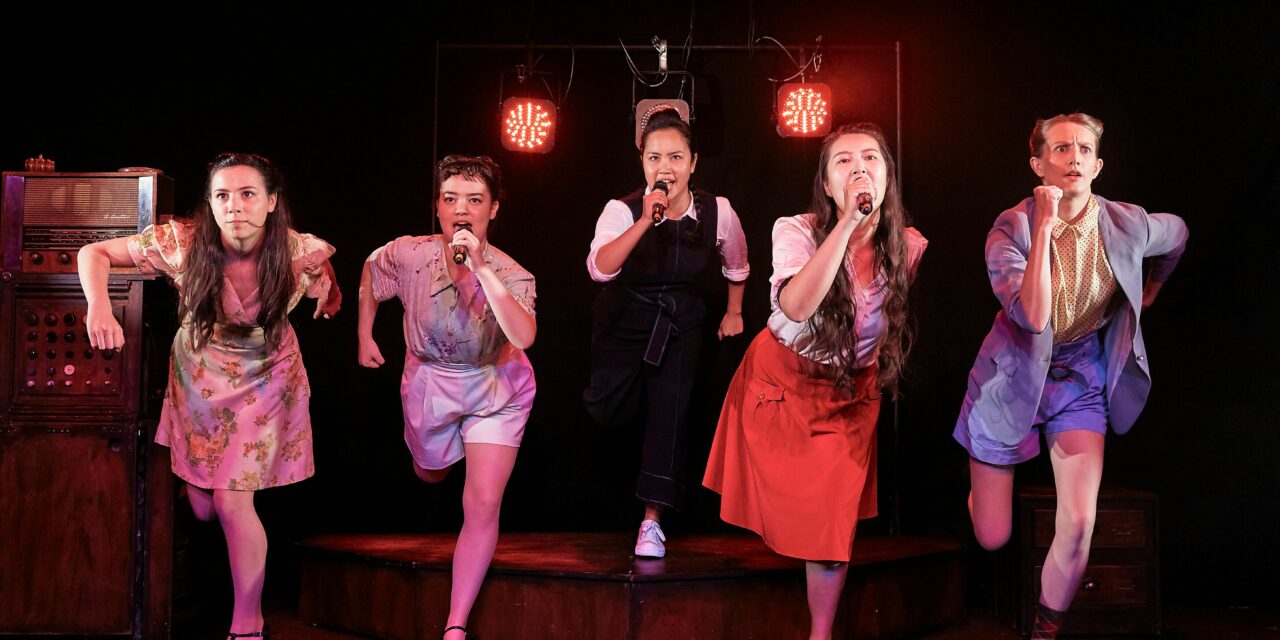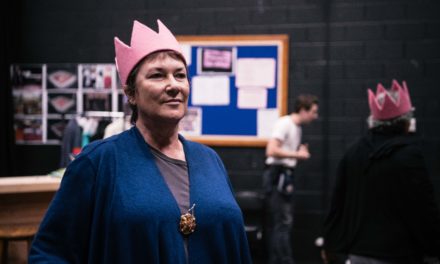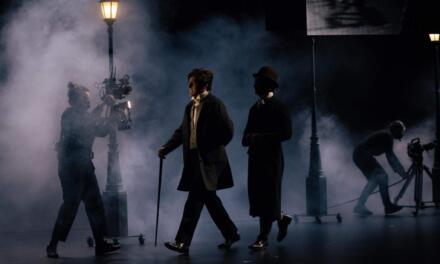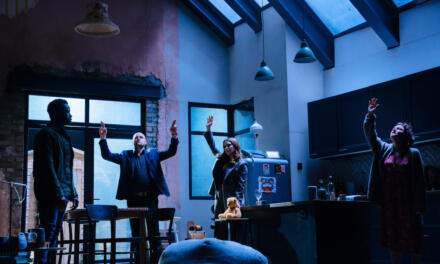Facts can be stranger than fiction. Every year, this truism gets demonstrated afresh—and with an irresistible force—by the Edinburgh Festival Fringe, where fact-based theatre comes in many guises and flavors. This year’s plays, musicals, and experimental performances were no exception to the pattern. Let us take a look at some of these works ignited and shaped by real-life incidents, however distant or unbelievable they may seem.
Burnt Lemon Theatre’s musical Tokyo Rose (Underbelly), written by Maryhee Yoon and Cara Baldwin, is a high-octane, Hamilton-esque chronicle of a controversial, if lesser-known, episode from American legal history: Iva Toguri D’Aquino’s riveting case from 1951 cuts deep into the heart of questions of American identity, citizenship, and patriotism. Impressively shouldered by an all-female cast of five (with Maya Britto as their brilliant lead), this compact work makes Iva’s ill-fated story come alive with startling effect. The reflective undertones of the songs make a good match with the flexible sparseness of Luke Robson’s design, and the use of the trial as a framing device helps create a dynamic structure that goes back and forth in time. While the fast pace of the production may be one of its defining marks, it yields greater pleasures when it slows down and takes a breath. With its timely reminder of America’s history of national ostracism, Tokyo Rose often feels like a most welcome revelation.
Another infamous moment from American history animates Rhum & Clay Theatre’s The War of the Worlds (Pleasance). Perhaps no single program in American broadcasting inspired more controversy or unending fascination than Orson Welles’ 1938 radio dramatization of an alien invasion. The mass panic supposedly created by this is what Isley Lynn’s play unpacks at first. But her exciting, formally playful exploration of this media myth soon gets derailed, as it devolves into a dull story about a journalist infiltrating into a strange family. With its more-than-ideal penchant for a shape-shifting structure, this take on Welles’ broadcast ultimately appears confused in its priorities. But no matter: all this can be forgiven thanks to consistently splendid performances by an ensemble of four. With their uncanny transitions between scenes, characters, and accents, these actors are thoroughly gripping, and it is easy to detect the many strengths of Hamish MacDougall and Julian Spooner’s direction behind their infectious energy.
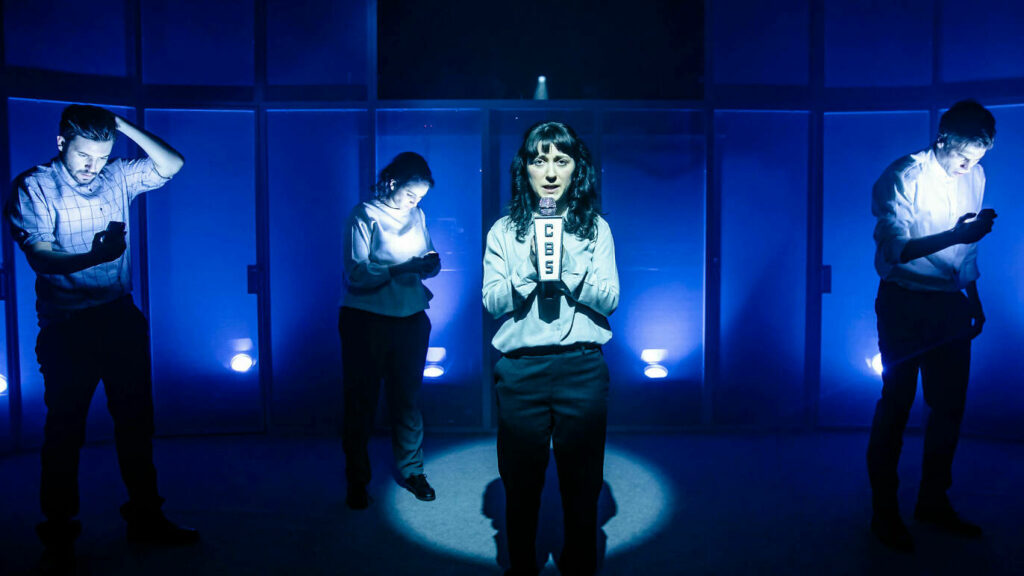
The cast of The War of the Worlds at the Pleasance Courtyard. Photo: Richard Davenport
In Until the Flood (Traverse Theatre), written and performed by Dael Orlandersmith, images of fluidity flow across several monologues that respond to Michael Brown’s 2014 murder in Ferguson by a white police officer. Orlandersmith embodies a wide range of characters of different races, backgrounds, and attitudes, which coalesce into a strained chorus of commemoration and culminate in a poetic coda. In its gentle call for empathy and social resonance, Until the Flood displays many moments of clear-eyed understanding, of both good and evil. Orlandersmith’s performance is an utterly chameleonic powerhouse, achieving considerable differentiation between her characters with minimal changes to her voice and movement. Even if the play’s multivocality may feel directionless and untethered at times, the final summation brings its shadowy undercurrents to a haunting head.
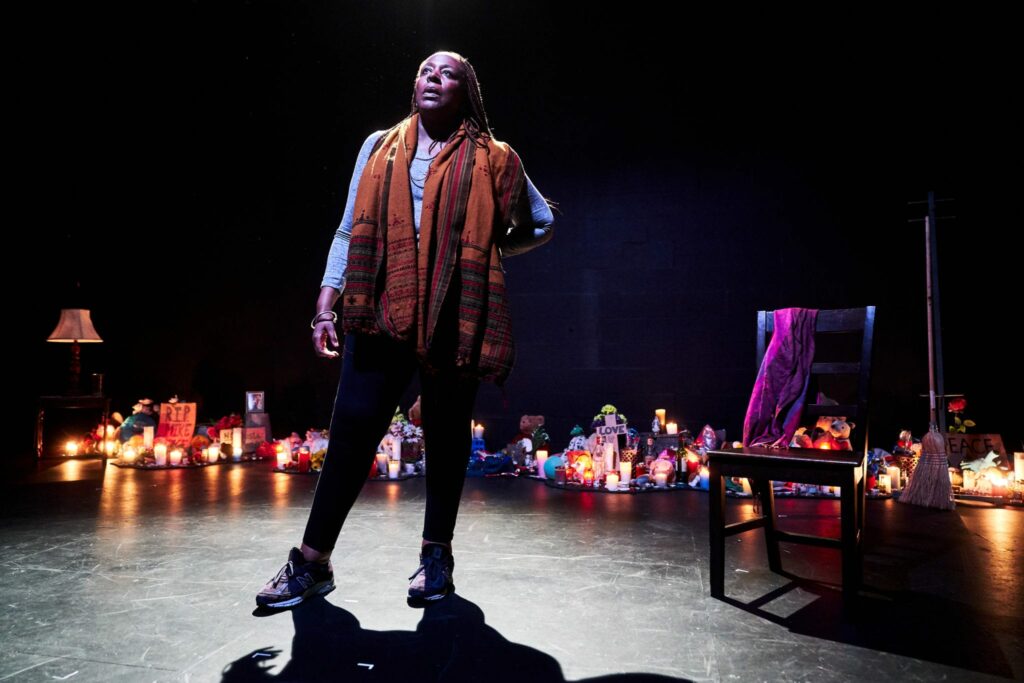
Dael Orlandersmith in Until the Flood at the Traverse Theatre. Photo: Alex Brenner
The three monologic voices of Lung Theatre’s Who Cares (Summerhall), written and directed by Matt Woodhead, enact a comparable series of exposures that are rooted in two years’ worth of interviews with young carers living in Salford, UK. This verbatim portrayal of three teenagers forced to lift the unbearable burden of their parents’ illnesses sheds much-needed light on some of the most precarious in British society. Pulsating with strong performances and piercing words, Who Cares delivers unexpected punches without wallowing in its bleakness; everyday humor and warmth manage to find their way into this otherwise devastating account. A spirited soundscape (curated by the interviewees) and evocative costumes breathe further life into this reality-check that should be heard by all.
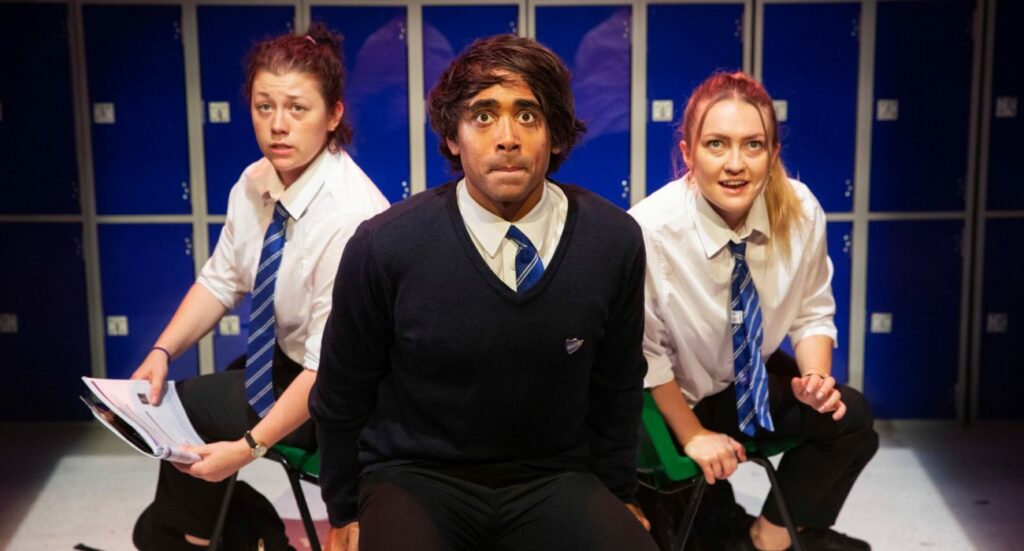
The cast of Who Cares at Summerhall. Photo: Murdo Macleod
New Diorama Theatre’s The Incident Room (Pleasance) takes us into the midst of a team of police officers intent on catching the so-called Yorkshire Ripper, whose murders of women spanned five years in the late 1970s, and who was finally arrested in 1981. The tensions among these detectives and their ever-changing strategies are reflected in a story that presumes to adopt a feminist slant by probing into the eyebrow-raising gender dynamics in the titular room. Yet Olivia Hirst and David Bryne’s script proves hesitant to embrace this approach fully, allowing it to be diluted by a number of other interests. As a result, the play is at its strongest not when it says something about the role of gender in the whole debacle, but when it tries to reckon with human error in the face of overwhelming data and inadequate technology. Nonetheless, the result remains a potent combination of suspenseful true crime drama and superb scenography (with striking projections by Zakk Hein).
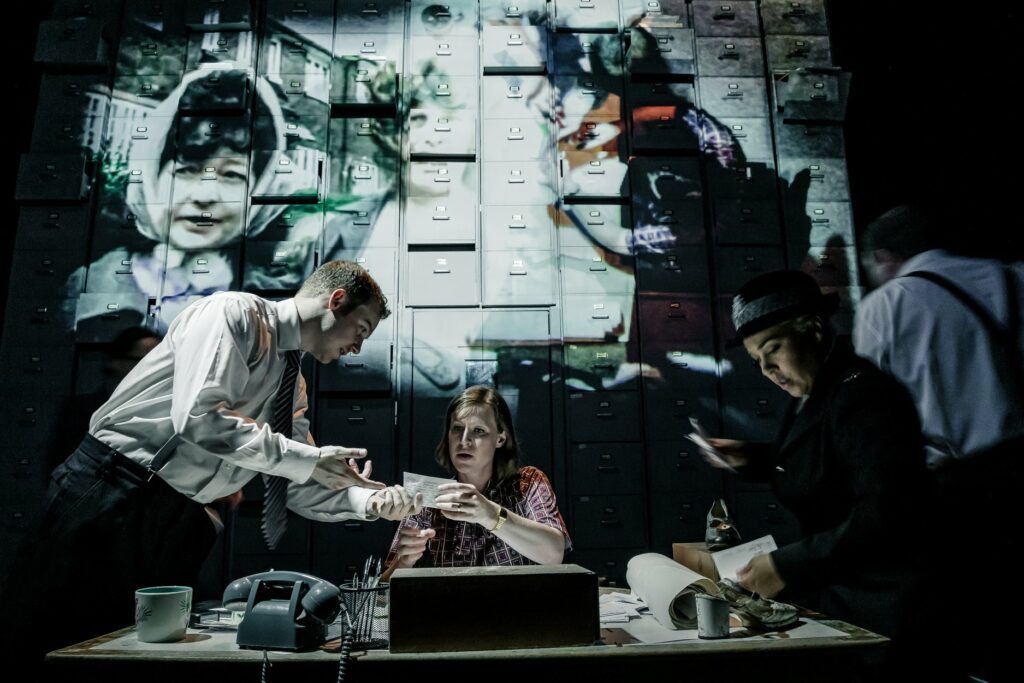
The cast of The Incident Room at the Pleasance Courtyard. Photo courtesy of The Other Richard.
Cardboard Citizens’ Bystanders (Summerhall) draws on elements of verbatim theatre to reimagine factual stories about the plight of the homeless in the UK. In a program note, the performers of the piece admit to having experienced homelessness themselves, and their personal investment in the undeniable importance of what they are bringing to our attention is tangible throughout. But the production as a whole suffers greatly from unclear storytelling, unnecessary audience participation, and tonal inconsistencies. Adrian Jackson’s script has simply an overabundance of storylines, only a few of which communicate their intended message with the right impact. For a show that concludes by asking its audience not to be bystanders to homeless deaths, Bystanders offers disappointingly little insight about either the causes or remedies of the injustices it speaks of. A radically decluttered version of this production, with less distracting use of design elements, could have left a much different aftertaste.
Rich Kids: A History of Shopping Malls in Tehran (Traverse Theatre) is a witty and erudite take on the myriad intersections of consumerism, technology, and history in contemporary Iran (and beyond). Co-created by Javaad Alipoor and Kirsty Housley, this digitally immersive piece encourages its audiences to use Instagram on their phones during the performance. Alipoor and Peyvand Sadeghian take on the role of experimental geologists of the world wide web, unafraid to break a few rules as they dig deep into the extravagant deeds and mishaps of the children of Iran’s revolutionary elite. Their brisk journey through the public repositories of social media admittedly takes more than it can swallow, especially as they keep broadening the scope of their critique without a strong sense of direction. By the end, nothing seems off-topic, because everything has somehow made its way into this engaging but baggy exercise in historical reflection. Despite well-played allusions to Susan Sontag, Walter Benjamin, and Göbeklitepe, Rich Kids works much better as an experiment in toying with audience attention than an incisive interrogation of collective memory.
Unpeeling a complex history is also one of the signature moves of The Afflicted (Summerhall), groupwork’s thoughtfully stylish dissection of psychosocial ills known and unknown. Through a well-calculated mixture of dance and documentary theatre, The Afflicted broods over the so-called “twitching disease” that spread among a group of teenage girls in Le Roy, New York in 2012. There are many things about this dazzling piece that make it an utterly memorable experience, but chief among them is the smart way in which it refuses to settle on a pat conclusion. As it slowly zooms in on the four girls who kept showing the symptoms long after others had recovered, it deploys this epistemic gray zone as an opportunity to ponder female rage, teenage angst, and mass hysteria. This unhurried engagement with issues of timeless import teems with wickedly elusive choreography and fascinating performances by a cast of four. Finn den Hertog’s direction establishes a delicate balance between the nightmarish and the sublime, creating a pervasive ambiguity that is rare to come by.
The personal and the political are intertwined with magnificent results in Sh!t Theatre Drink Rum with Expats (Summerhall), in which the iconic duo Becca Biscuit and Louise Mothersole go on to drink rum, and beer, with the audience. In this sincerely layered romp through the murky waters of Europe, Sh!t Theatre recounts their experience of traveling to Malta to make a show for the Valetta European City of Culture. But theirs is no mere recounting: it is streaked with a slew of intriguing digressions about the rampant migrant crisis in the region, as well as the colorful personalities they met during their time there. What emerges by the end of this fun, intelligent, and tipsy hour is not only a strong sense of togetherness (thanks to free drinks and crowd-surfing), but also a sobering panorama of corrupt politics, contested borders, and imperiled lives. As they deconstruct and reconstruct the necessarily apolitical show they had to present in Malta, Becca and Louise end up posing unexpected questions about the double binds that art—political art, in particular—often finds itself in.
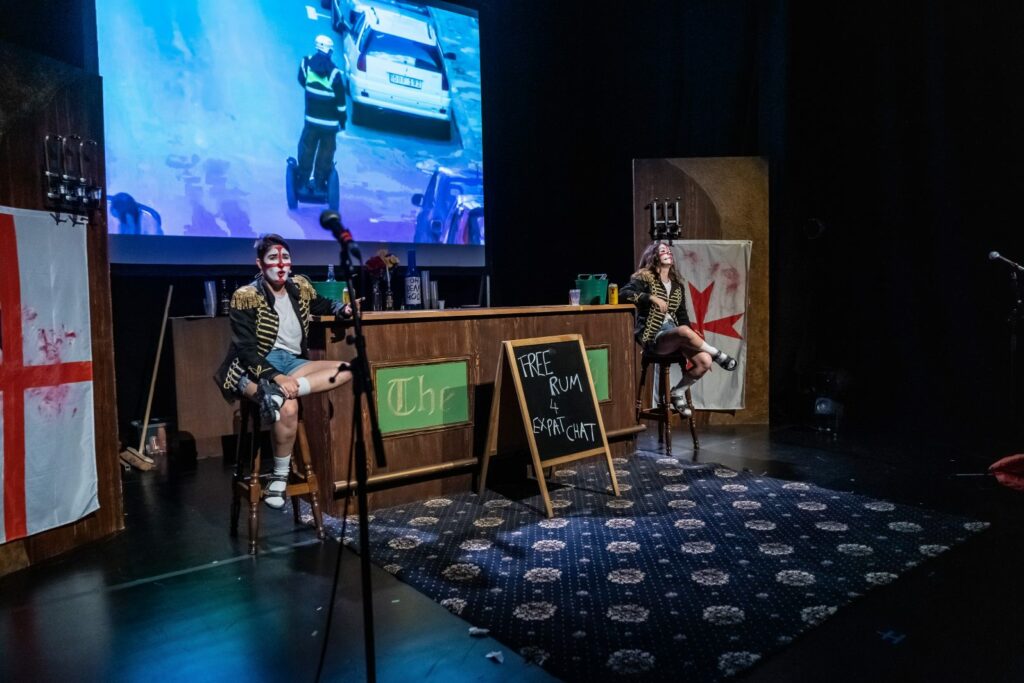
Louise Mothersole and Becca Biscuit in Sh!t Theatre Drink Rum with Expats at Summerhall. Photo: Aly Wight
This post was written by the author in their personal capacity.The opinions expressed in this article are the author’s own and do not reflect the view of The Theatre Times, their staff or collaborators.
This post was written by Mert Dilek.
The views expressed here belong to the author and do not necessarily reflect our views and opinions.

